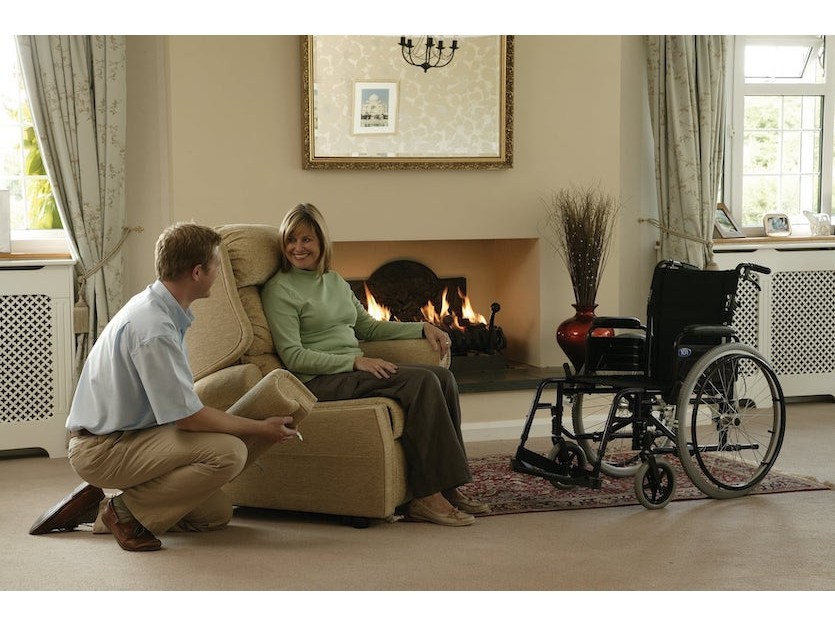The 2020 pandemic presents the greatest threat to UK businesses most of us have ever seen. But some companies have found innovative ways to survive and this is another of their stories
 RISE & Recline is a Nottingham-based manufacturer of bespoke furniture for the mobility and general comfort market. Every product is hand-produced in its Long Eaton manufacturing plant.
RISE & Recline is a Nottingham-based manufacturer of bespoke furniture for the mobility and general comfort market. Every product is hand-produced in its Long Eaton manufacturing plant.
When the pandemic hit, the company experienced an immediate drop of over 85 per cent in sales and customers stopped paying – normally a catastrophic double-blow to all but the richest companies as the cashflow disappears. The future looked very grim.
 John Lougher, (left) director of Rise & Recline, helped to set up a management workout session to involve everyone in what its response should be. This focused on two areas. What the company knew: lower sales, cash flow under pressure, concerns over staff morale, suppliers were closing down, the furlough scheme was available and customers were closing the door either for good or to weather the storm. And what the company did not know: how long the situation would last and what would happen post-COVID-19.
John Lougher, (left) director of Rise & Recline, helped to set up a management workout session to involve everyone in what its response should be. This focused on two areas. What the company knew: lower sales, cash flow under pressure, concerns over staff morale, suppliers were closing down, the furlough scheme was available and customers were closing the door either for good or to weather the storm. And what the company did not know: how long the situation would last and what would happen post-COVID-19.
This helped John and his team to form a plan of action. First, they communicated with their customers to see how many were going to continue to work through the pandemic to provide products to people with disability/health needs. Then they established how many staff were needed to keep working to meet customers’ needs. They explained the situation fully to staff and outlined their actions. Rise & Recline furloughed more than 60 per cent of its staff and all those who could work from home were supported to do so and IT systems were adapted.
The business communicated with its bank, HSBC, to see what support it could offer and explain its plan to work through COVID. They agreed to a Coronavirus Business Interruption Loan that relieved cashflow issues and set up regular reviews with the bank manager.
And finally, Rise & Recline communicated with its suppliers, saying that everyone would be paid so that they could have some security in making their plans to work through the difficult times.
Then came the really clever stuff. The company took an ‘outside-in’ look at its business and identified all of the opportunities that were afforded by having management time freed-up due to the pandemic reducing the day-to-day business. The enforced slow-down offered management the chance to do what they rarely got to do in normal times: they got to step back and have a good look at what the future of Rise & Recline could look like.
It was clear that for a small business to survive it could not rely on cost-cutting alone and it needed to become more efficient. The team decided that technology and innovation was something that could make a big difference.
John Lougher takes up the story: “We knew that we did not have the resources in either skills or cash to do the things we wanted so we looked at where we could get help. Government grants sounded good but we found that the speed the agency worked at and the bureaucracy involved made this a long-winded, ineffective and frustrating process.
“Then we found out that our local Nottingham Trent University were keen on working with, and supporting a number of initiatives for, local companies. This was a much more positive experience and we got agreement to a joint venture within days, proving that academia and business can work together.”
Research and development are vital to the future success of many businesses and universities hold a wealth of expertise in this area. By sharing this knowledge through consultancies, universities can provide businesses with the knowledge and skills they need to meet their demands in this area. What often surprises the businesses they help is that the experts have strong experience of working in industry – they don’t just offer theoretical solutions; their assistance is very practical.
On the other side, collaboration with industry is key for universities to help them in areas such as course development through co-design, and securing opportunities for their students and graduates. It also allows them to push boundaries, disrupt the status quo, and apply their knowledge to real-world big problems.
Together, Rise & Recline and Nottingham Trent University (NTU) have been working on a bespoke production planning and control system, called R2, that works with Rise & Recline’s hand-building production schedule. This had the potential to achieve a seven- to ten-day turnaround in an industry that traditionally takes four to six weeks.
John Lougher again. “Chinese products have been flooding our market for years and although we have been offering seven to ten days for some time it was like juggling six balls at a time. Ninety-nine per cent of our components are made and supplied in the UK by British companies and we communicated to them what we were doing. We have made some changes to the way we work with suppliers to fit with our new system.
“We now have our dedicated R2 Production Planning and Control system that interacts with our new CRM system to speed up communication with customers and to give us real-time vision of where every product is in the production process. We can plan in holidays, express orders and manage absence and supply issues much more efficiently and we have linked our logistic route-planning to R2 to ensure our customers get accurate information on their delivery.”
At the same time Rise & Recline embarked on a revamp of its website and CRM system with its partners Quiet Storm based in Coalville, Leicestershire. The joint project team has come up with an interactive website that can provide retail partners with a modular, prescriptive consultation process. At the end of the consultation, the customer has a print-out of the chair or bed that suits them best. It’s a bit like building new car online.
Once agreed, this is connected directly to the CRM to process the order. The system even gives retail partners the opportunity to have Zoom or Facetime calls with those customers who are not able to leave their house or care home. This presented a fantastic customer service during the pandemic.
 The new production planning system and the online services relied heavily on the creation of CAD drawings and this work fell to 25-year old design graduate Rajatha Ravindra (right) who completed all the CAD drawings as part of her work for her master’s degree.
The new production planning system and the online services relied heavily on the creation of CAD drawings and this work fell to 25-year old design graduate Rajatha Ravindra (right) who completed all the CAD drawings as part of her work for her master’s degree.
Rajatha is an architectural designer who uses computer-aided design (CAD) in her work and she told us: “CAD is one of the most popular software used by architects and my experience at Rise & Recline certainly helped me get better at it. I have to say that it was an amazing experience to work with John and his team.
“Everyone in the office was supportive from the beginning and made my journey stress-free. Working at Rise & Recline also added a huge value to my resumé and enhanced my chances of working as a CAD technician.
“For students who are looking for similar opportunities, I would definitely tell them to keep an eye on university job websites, which can bring you such unexpected roles and boost your CV. I learnt that these experiences are very important for our career development when I got a job interview for a similar position and they were keen to know more about my role at Rise & Recline.”
 David Harper (left), head of economic programmes at Nottingham Trent University describes how the relationship with Rise & Recline came about.
David Harper (left), head of economic programmes at Nottingham Trent University describes how the relationship with Rise & Recline came about.
“The company had been awarded a grant from the D2N2 Growth Hub to build a new website with built-in functionality to allow customers to create bespoke orders, and John, the managing director, wanted support to digitally connect the new order system to the shop floor. Previously, orders had been made over the phone, hand-written, and physically taken down to the production staff, resulting inevitably in a costly degree of human error.
“The company wanted fast, practical support to look at how they could introduce some digital solutions that integrated with their existing software, and had some initial reservations about whether this could be achieved in the required timeframe.
“We connected John to specialists in the Nottingham Business School – Associate Professor Roy Stratton and Dr Aquila Yeong. Roy and Aquila had worked previously with another manufacturer on a Knowledge Transfer Partnership (KTP) to improve productivity by understanding in depth the constraints holding back the business, and then designing and implementing solutions with a computing backbone.
“To help meet Rise & Recline’s needs they looked at a similar scaled-down approach for this shorter consultation. Following an initial diagnostic meeting with Rise & Recline to understand the problem, Aquila then took the work on as a research project that has spanned much of 2020.
“His solution, which is in the process of being implemented, connects the online order to the shop floor all the way through to delivery. In doing so, I believe we have a new convert in the benefits of industry-university collaboration.
“We believe that the relationships between industry and universities are symbiotic, with these kinds of collaborations offering huge benefits to both sides.”
John Lougher agrees. “The team at NTU have been amazing and I would recommend that all UK businesses explore the opportunity of working with their local university. The senior managers at NTU understand the need for speed and the doctors and graduates who have worked with us to produce R2 and develop CAD drawings for all of our products have delivered real added value to our business at minimal cost.
“Communication, transparency, having a great team and a clear vision has enabled us to get to where we are. There is help available and if government could understand how better to facilitate this relationship between the often-distant worlds of academia and business it would be a powerful force for good in the UK.”
Rise & Recline is in a strong position to survive the pandemic and ensure that whatever the market landscape is post-COVID-19, the company is confident that it has more robust processes and enhanced relationships with its customers, its suppliers and its staff.
If your company has a similar good news story arising from the trials of the pandemic, please get in touch. Email editor@madeinbritain.org, putting SILVER LINING in the subject line.
By Made in Britain 4 years ago | By Made in Britain